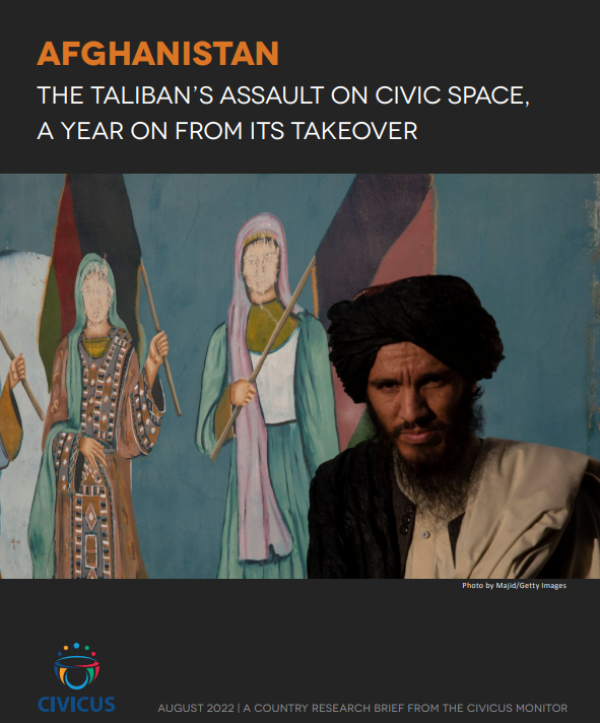
Read this report by CIVICUS', on one year on from Afghanistan's takeover by the Taliban. The report includes: the harassment and threats against human rights defenders; arbitrary arrests, abductions and killing of activists; targeting of civil society staff and offices; repression of protests; forced confessions; media restrictions; journalists at risk; shutting down of key institutions; challenges for activists in exile; and the international response.
"Over the last year, human rights groups and the United Nations (UN) have highlighted how the Taliban has sought the erasure of women from public life, including the suspension of girls’ secondary education, severe barriers to accessing employment and healthcare and limits on freedom of movement. Afghanistan’s rapidly escalating humanitarian crisis has exacerbated these abuses, depriving much of the population of access to food, water, shelter and healthcare. There have also been reports of ongoing extrajudicial and revenge killings of former officials and members of the security forces.
At the same time, the Taliban have made a systematic assault on civic space, which is rated as repressed by the CIVICUS Monitor. Human rights defenders and journalists have faced harassment, attacks, arbitrary arrests and detention. In some cases, they have been tortured or ill-treated, abducted, killed, or disappeared. Civil society offices have been raided and funds frozen. There have been severe restrictions and disruption of
peaceful protests, particularly those led by women, with excessive force used. The Taliban have dissolved the national human rights institution and taken over the bar association.The following further details the significant civic space concerns that have been documented during this period."
The report recommends the following to the international community:
- Publicly urge the Taliban to respect human rights, including fundamental freedoms in line with international human rights law and standards.
- Call on the Taliban to ensure all people in Afghanistan can exercise their rights to the freedoms of association, peaceful assembly and expression, and end the harassment, abuse, arbitrary arrest and detention of all protesters.
- Take proactive steps to provide immediate practical support and protection to human rights defenders, journalists and civil society activists at risk.
- Provide Afghan human rights defenders in exile with financial, diplomatic and political support, including by issuing humanitarian visas and effective funding resettlement programmes.
- Create an enabling environment conducive for all Afghan refugees and asylum seekers to recover from the psychosocial pressures they endured in Afghanistan and the anxieties they may experience settling in a new country.
- Ensure that UNAMA has a robust mandate to monitor and report on human rights and has the resources and capacity to extend its reach, and support local organisations to carry out their human rights work.
- Call on the Taliban to reinstate the Afghanistan Independent Human Rights Commission and the Ministry of Women’s Affairs.
- Continue to support, strengthen and sufficiently fund the mandate of the UN Special Rapporteur on the situation of human rights in Afghanistan and urge the Taliban to co-operate fully with the mandate.
- Support efforts to investigate all alleged violations of international human rights law, international humanitarian law and other serious human rights violations, including gendered dimensions of such violations and abuses, by all parties in Afghanistan, via the establishment of an independent investigative mechanism, such as a fact-finding mission or commission of inquiry, mandated by the UN Human Rights Council.
- Call on the UN Security Council to facilitate inclusive, intra-Afghan peace talks with the effective representation of human rights defenders, particularly women and representation from all ethnic groups, and include guarantees of safety and effective and equitable representation of views.
- Offer strong political and practical support to the International Criminal Court’s investigation on
- Afghanistan and provide adequate resources to allow the Office of the Prosecutor to investigate all crimes perpetrated by all parties to the conflict in Afghanistan.
- Ensure that political recognition and representation is not extended to Taliban-affiliated authorities